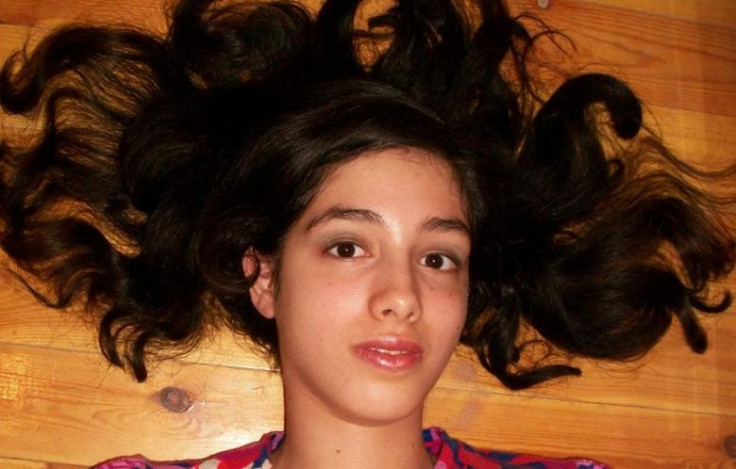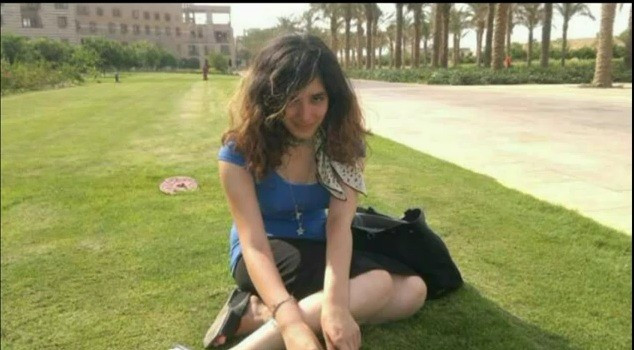2011 Remembered: Nude Blogger Aliaa Magda Elmahdy and the Arab Spring

Aliaa Magda Elmahdy, the nude Egyptian blogger, fused the Arab Spring and the rise of the protester to a singular effect.
Western civilisation is bombarded by images on a daily basis to such an extent that we forget the potential impact that a single picture can have on society.
Elmahdy, a 20-year-old art student from Cairo, whose story was broken by the International Business Times UK, demonstrated this to us as she signalled the symbolic change that has taken place in the world over the past year.
After she tired of the Islamic patriarchal bigotry that "destroys nude statues of antiquity, hides art books and covers artists' models", Elmahdy decided to post nude photographs of herself on her blog. The human rights activist Ahmed Awadalla immediately backed her move on Twitter, which sparked heated debate on social networking sites. The hash tag #NudePhotoRevolutionary went viral and the photos received thousands of hits.
The photos also evoked comments ranging from gushing praise to an angry backlash, with some fearing that they could tarnish Egypt's revolutionary image. "Egyptian liberals will now be seen as pro-nudity and that could really damage their election campaign," said Ruwayda Mustafah, a blogger for the Huffington Post and Global Voices.
Reports that suggested a link between Elmahdy and the April 6th movement, which had been instrumental in ousting President Hosni Mubarak, were dismissed by the group. "We are conservative youths and we always encourage our members to be role models as far as ethics are concerned," a member of the movement said. "How could we have accepted the membership of a girl who behaves like this?"
Elmahdy herself later played down her role in the movement, although her boyfriend, Kareem Amer, who spent four years in prison for posting blogs that were insulting to both Islam and Mubarak, is regarded as a hero for the cause of freedom of expression in Egypt.
This raises the question as to why the same group of activists, who ignited a revolution, defeated security forces, marched proudly and stood defiantly against a brutal regime, bristled when women's rights were brought to the fore?
Moderate does not mean liberal

Women have been the most consistent advocates of civil rights across the Arab world during this year's uprisings. Assaulted and even sexually abused by the authorities, they have pledged that they will not relent in their calls for more rights, more access to political life and more freedom.
Having frequently suffered from discriminatory legislation that has aimed to minimise their role in public life, they are well aware that a "democracy" for only half the people is not a democracy at all.
The Muslim sisterhood in Egypt is attempting to forge a different path for themselves and their country. While women previously did not have a political role, after the revolution that toppled Mubarak, the Muslim Brotherhood, Egypt's oldest and largest Islamist organisation, became more receptive to women's demands.
Moahamed Badie, the Brotherhood's supreme leader, recognised their importance during the revolution when he said: "Women made history and, with their success, they gave the whole world a lesson about how to fight injustice and tyranny".
Members of the Muslim sisterhood have been at the forefront of the Brotherhood's social and political struggle, as they joined demonstrations and protests. They also helped to shape the organisation's political wing, the moderate Islamist Freedom and Justice Party, following the pioneering example set by the Justice and Development Party of Recep Tayyip Erdogan in Turkey.
As Turkish journalist Mustafa Akyol pointed out in a recent article in The Times, however, the growing influence of moderate Islamists has not been accompanied by a corresponding awareness of human rights issues.
"Moderate does not necessarily mean liberal," he wrote. "Most Muslims in the Middle East are, in the words of the sociologist Amitai Etzioni, 'moderate but illiberal': they reject terrorism, but they are not great fans of women's rights or freedom of speech."
This further underlines why Elmahdy is both visionary and emblematic of the changes taking place in the Arab world.
Her radical action calls on politicians, activists and the common people to rethink the revolution in terms of wider human rights issues involving control over one's own body, as well as freedom of expression and religion.
Mona Eltahawy, an Egyptian-American journalist who was recently arrested and beaten up by security forces in Cairo, labeled photos of Elmahdy's naked body as "a bomb aimed at the patriarchs in our minds".
Eltahawy wrote in the Guardian: "She is the Molotov cocktail thrown at the Mubaraks in our heads - the dictators of our mind - which insists that revolutions cannot succeed without a tidal wave of cultural changes that upend misogyny and sexual hypocrisy."
Body protest strikes back

Elmahdy defines herself as "secular, liberal, feminist, vegetarian and individualist Egyptian". Her naked protest has a historical antecedent in the feminist movement that swept the West in the late 1960s, which challenged the morality and tradition of conservative societies. During the feminist revolution in that period, women used their bodies as a mode of expression and as a tool for the liberation and transformation of gender restrictions.
In the 21st century, nude (and partially-nude) protests have become commonplace, as they have been used to draw attention to issues as varied as animal rights and misogyny. Examples of nudity have also featured regularly at the Occupy Wall Street anti-capitalist protests and the Ukrainian feminist movement, Femen, has acquired global renown for organising topless protests against misogyny and other social maladies.
As many commentators have pointed out, nude protests allow those in a position of weakness to show their strength. It is never the protester who appears ridiculous, writes Christian Buss on Der Spiegel, but the oppressive authorities who rush out to cover up the nude body, even if only symbolically. In Elmahdy's case, it is the Egyptian Coalition of Islamic Law Graduates, which filed a suit against her and her boyfriend on the charges of "violating morals, inciting indecency and insulting Islam."
According to experts, the rise of naked protests in modern times is coupled with the perception that the personal is political. In philosophy, personalism is the broad array of movements that privilege individual subjects over abstract systems. In the 20<sup>th century, the adoption of a subject-oriented perspective in the Western world has led to the predominance of individual moral truths over abstract truisms. As the body is seen the most obvious site of oppression, the "bare protest", as it sometimes called, is a natural path to liberation.
At a time when Islamists are securing power in Egypt, Elmahdy baring her body is "the ultimate act of rebellion", according to Maryam Namazie, an Iranian-born activist based in the UK.
Namazie has launched a nude '"revolutionary" calendar in tribute to the Egyptian blogger. Slut Walk co-founder Sonya JF Barnett and comedian Shabana Rehman are among those who agreed to pose nude for the calendar.
Other bloggers have also gotten on to the bandwagon and published nude pictures of themselves in support of Elmahdy. Perhaps a wave of nude activism will wash over the Arab world in 2012, sweeping away residual pockets of conservative resistance and denouncing abuses such as "virginity tests".
As Egyptian-American actress Amanda Azim said: "If you have a problem with nudity, you have a problem with humanity." This is the true legacy of Elmahdy, the blogger who shook the Arab World.
© Copyright IBTimes 2025. All rights reserved.






















